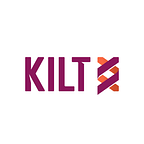New Code Examples — Making Integrating KILT Technology Easier
With increasing adoption of KILT Protocol by both enterprises and other blockchain projects, the KILT development team is refining existing processes and making integration easier.
To date, integration was done using the KILT Software Development Kit (SDK) and adapting the open-source code of the existing applications (e.g., Sporran wallet, SocialKYC credentials).
Following feedback, to simplify the integration process, the KILT development team has now created two simple TypeScript code examples: one for Attesters, one for Verifiers.
Attesters and Verifiers on KILT
Using KILT Protocol, any entity can monetize their trusted reputation in the physical world by becoming an Attester and issuing reusable digital credentials.
A Verifier can be any entity that chooses to accept pre-existing credentials that meet their needs.
Integrating KILT’s identity solutions doesn’t require any blockchain skills, and there are no license costs or contracts.
A hash of the credential is anchored to the KILT blockchain by the Attester. The Verifier reads the hash to ensure the credential is still valid. Both of these functions require a web application that can interact with the KILT blockchain. These applications can now be easily built using the TypeScript code examples.
Testing Environment
The code examples for Attesters and Verifiers use the KILT Credential API (Application Programming Interface). Developers can run the code on Peregrine, the KILT testnet, to build and try out the application in a test environment at no cost. Peregrine Coins (which have no monetary value) can be obtained for free from the faucet. Once the developer has tested their application they can then configure the application to work with the KILT blockchain.
Each code example intentionally includes only the necessities to make the application run, and is not opinionated about implementation, so it can be reused in whatever architecture the developer chooses. To run as a service, the developers can optimize and secure the application to meet their own requirements.
The KILT Attester Example
The CertifiedProof decentralized application (dapp) is an example web application for attesting and revoking KILT credentials.
The code example keeps the application as simple as possible. Out of the box it attests two basic claim types (CTypes). A CType is the format of information required for the credential.
Existing CTypes can be used in their original form or a new one can be created by adding different information fields, ways of paying for the credential, security measures, or any other requirements.
Larger entities may also want to build their own version of the Sporran wallet, which the Claimer can download on their own device to generate their decentralized identifier (DID) and store their credentials.
The KILT Verifier Example
The ProofCheck decentralized application (dapp) is an example web application for verifying the KILT credentials.
Using the dapp, the Verifier can check that the credential is connected to the DID of the Claimer, that it was attested by the DID of the trusted Attester, and that it hasn’t been revoked.
In the real world the Verifier can choose which credentials they accept to meet their needs. For testing purposes, developers require KILT credentials. SocialKYC credentials can be obtained for free here and used for testing.
Summary
The CertifiedProof and ProofCheck code examples make it easier for Attesters and Verifiers to integrate KILT identity solutions.
A code example that can be used to implement a login with a KILT credential is also being developed to make integration even easier for Verifiers. This will be as easy to install and use as normal Web2 website services.
These developments contribute to the real-world adoption of blockchain technology and the return of control of private data to its owner.
About KILT Protocol
KILT is an identity blockchain for generating decentralized identifiers (DIDs) and verifiable credentials, providing secure, practical identity solutions for enterprise and consumers. KILT brings the traditional process of trust in real-world credentials (passport, driver’s license) to the digital world, while keeping data private and in possession of its owner.
